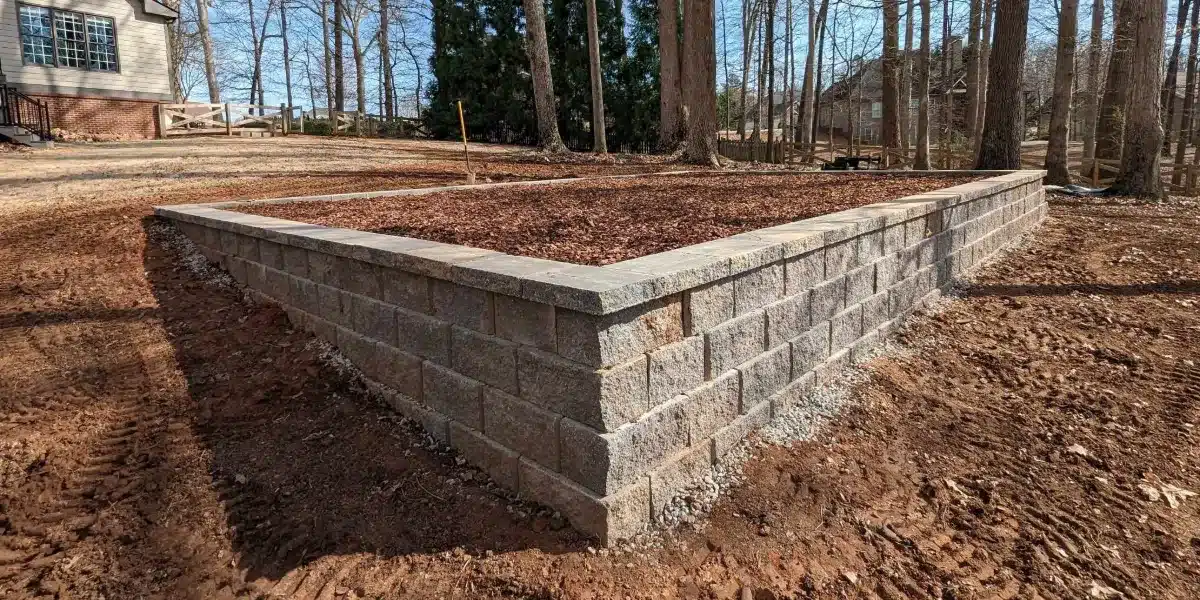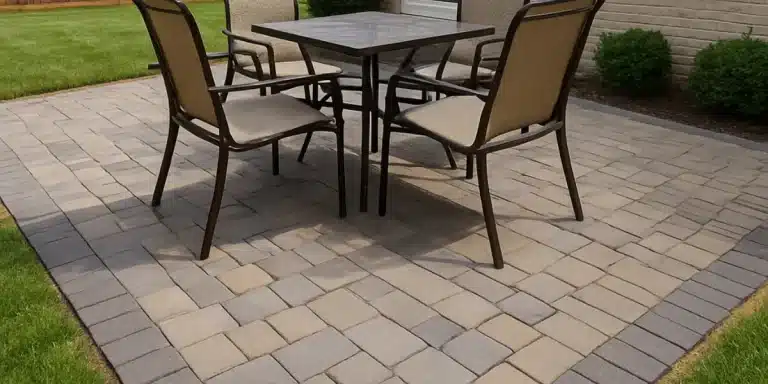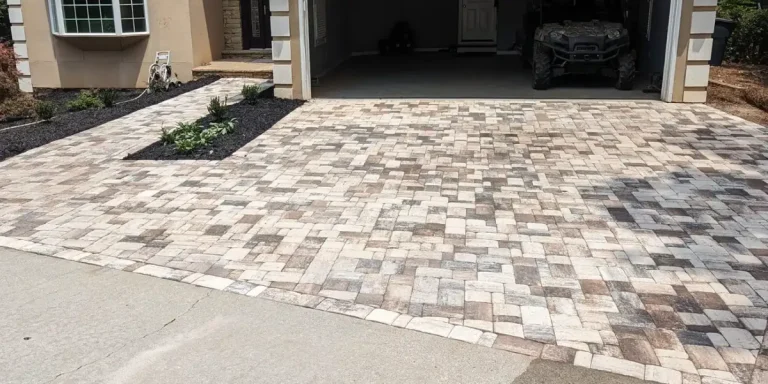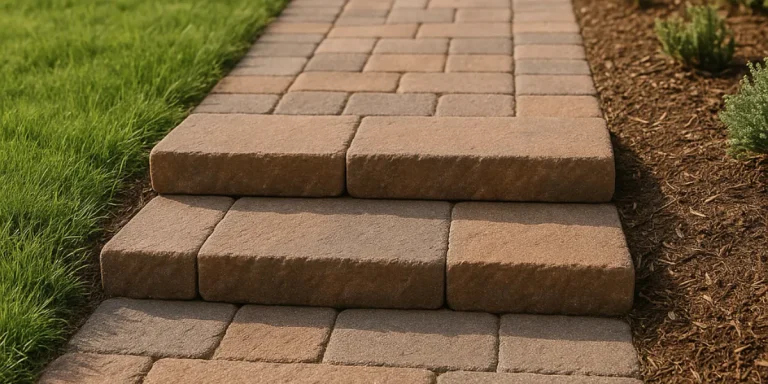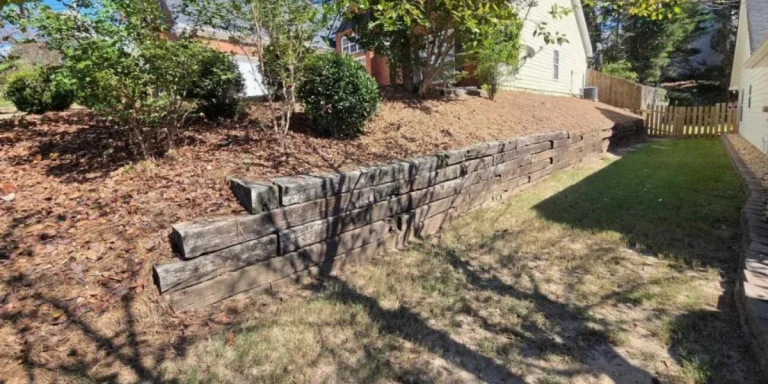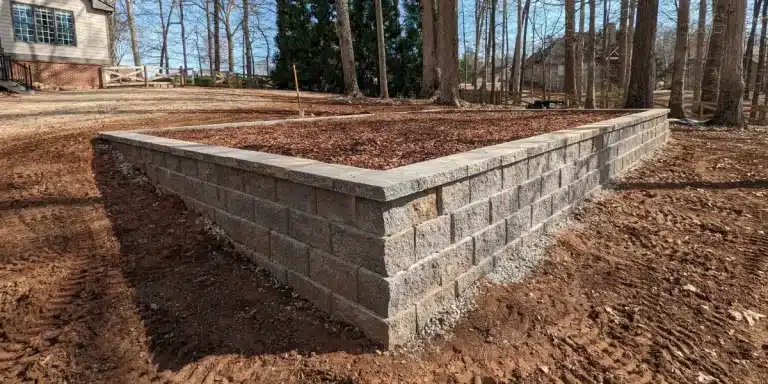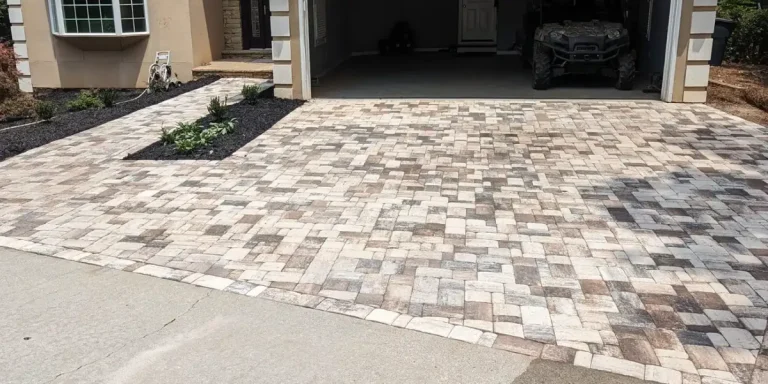How to Choose the Right Block for Retaining Walls
If you’re planning to install or replace a retaining wall on your property, selecting the right block is one of the most important decisions you’ll make. From supporting soil to managing water and creating visual appeal, retaining wall blocks play a major role in both performance and aesthetics.
At Razor Sharp Lawn and Landscape, we’ve installed dozens of retaining walls across Gainesville and Northeast Georgia. This guide will walk you through the options and help you understand which type of block is best suited for your project.
Why choosing the right retaining wall block matters
Not all retaining wall blocks are created for the same conditions—or for the same outcomes. Choosing the wrong material can lead to a number of avoidable issues: poor drainage that builds up pressure behind the wall, premature cracking or shifting, or an overall design that clashes with the rest of your landscape. Worse still, low-quality blocks may not hold up in Georgia’s clay-heavy, erosion-prone soils, especially on sloped properties.
On the other hand, selecting the right block gives you real advantages:
-
- Long-term strength and erosion resistance – Engineered blocks are designed to interlock securely and withstand pressure from soil, water, and changing temperatures.
- Design flexibility – From straight lines to sweeping curves, modern block systems can accommodate custom layouts, multi-tier structures, or even integrated seating areas.
- Improved drainage performance – The right block works hand-in-hand with professional drainage solutions, allowing water to flow freely and reducing the risk of wall failure.
- Low-maintenance durability – Properly chosen and installed blocks won’t rot, warp, or deteriorate, giving you peace of mind for years.
At Razor Sharp Lawn and Landscape, we use trusted, proven systems like Keystone® retaining wall blocks, which are engineered for Georgia’s unique terrain and weather conditions. These materials not only deliver structural integrity but also pair well with other features we design—such as drainage systems, landscape lighting, paver patios, and plant bed installations—to create a cohesive and functional outdoor space.
Whether you're replacing a failing timber wall or building new on a sloped lot, our team ensures that every wall we build is matched to the needs of your property, your soil, and your long-term landscape goals.
Key factors to consider when choosing a block
1. Wall height and purpose
The height of your retaining wall determines more than just how much material you need—it impacts structural demands, block selection, and whether engineering is required. A short garden wall may only need basic blocks and minimal support, but a tall wall supporting tons of soil must be reinforced and built with precision.
-
-
- Short walls (under 3 ft): Ideal for raised garden beds, seating walls, and decorative borders. We typically use lightweight garden wall blocks that are easy to install and offer aesthetic flexibility.
- Medium walls (3–6 ft): These require more structure, so we use segmental retaining wall (SRW) blocks with interlocking features that distribute pressure effectively.
- Tall or structural walls (6 ft+): These require engineered blocks, geogrid soil reinforcement, and may involve building permits. We coordinate with local engineers when necessary.
-
Razor Sharp Lawn and Landscape also ensures nearby landscape features—such as paver patios, planting beds, or drainage swales—are factored into your overall plan for function and curb appeal.
2. Soil type and slope
Your property’s soil and slope directly affect which retaining wall system is best. In Northeast Georgia, clay-heavy soils and seasonal rains pose challenges like poor drainage and shifting subgrades.
-
-
- In compacted or clay-based soils, we often use open-core blocks that promote better drainage and reduce pressure buildup.
- On slopes, we recommend systems that work with geogrid reinforcement, tying the wall back into the hillside for extra strength.
- For areas with water runoff issues, we often suggest upgrades such as French drains or grading adjustments to protect the wall’s longevity.
-
Because we also specialize in drainage systems and property grading, our solutions go beyond the wall itself to protect your entire outdoor space from erosion and water damage.
3. Aesthetic preferences
Functionality is critical, but a retaining wall should also enhance your landscape visually. Today’s block options allow homeowners to match their wall to their home and yard’s style.
-
-
- Split-face or textured finishes: Mimic natural stone, great for traditional or wooded landscapes.
- Tumbled blocks: Offer a worn, rustic look, popular in cottage or farmhouse settings.
- Smooth-face blocks: Ideal for clean, modern landscape designs.
-
We also offer a variety of earth tone and charcoal color blends to complement your home’s palette. Many of our clients coordinate their retaining walls with walkways, outdoor firepits, or patio installations for a cohesive, high-end look.
4. Drainage requirements
The best-looking wall won’t last if it doesn’t drain properly. Drainage is the most overlooked yet critical component of any retaining wall system.
Every wall built by Razor Sharp Lawn and Landscape includes:
-
-
- Gravel backfill behind the wall for structural support and water flow
- A perforated drain pipe to redirect water
- Geotextile fabric to separate soil from drainage stone
- Surface grading or swales to direct runoff away from the structure
-
Depending on your property and the block system chosen, we may recommend additional measures such as through-wall weep holes or deeper base preparation. These best practices are standard in our retaining wall construction and drainage control services across Northeast Georgia.
Common types of retaining wall blocks we use
At Razor Sharp Lawn and Landscape, we work with a range of high-quality retaining wall blocks that perform well in Northeast Georgia’s climate and terrain. The right block choice depends on your property’s slope, soil conditions, drainage needs, and the visual style you want to achieve. Below are some of the most popular and effective options we use in our retaining wall projects.
Keystone® Compac SRW Blocks
These are our go-to blocks for taller, load-bearing walls that require structural strength. Keystone® is one of the most trusted names in the industry, and their Compac system is engineered for long-term performance.
-
- Designed for use with geogrid reinforcement, making them ideal for walls over 4 feet or those supporting driveways, slopes, or structures
- Tapered design allows for smooth curves, corners, and terraced walls
- Textured face gives a natural stone look that blends well with landscaping features like garden beds or patios
- Durable enough for both residential and commercial use
We often pair Keystone® walls with drainage upgrades and property grading to prevent erosion and maximize lifespan.
Garden wall blocks
For smaller, non-structural projects, garden wall blocks are a cost-effective and visually appealing solution. These are ideal for adding charm and function to front or backyards.
-
- Lightweight and easy to install, perfect for raised planter beds, seating walls, or edging
- Available in a range of colors and finishes to match existing landscape elements
- Best suited for walls under 3 feet and areas not exposed to heavy water flow or soil pressure
These blocks are often used alongside mulch beds, stone pathways, or ornamental plantings to define space and enhance curb appeal.
Modular block systems
Modular retaining wall blocks offer a versatile option for homeowners who need both strength and aesthetics in a mid-size wall. They strike a balance between decorative appeal and structural integrity.
-
- Built-in interlocking lips or pins provide added stability without the need for mortar
- Easily adapted to curved, tiered, or terraced designs, which is helpful on sloped lots
- Perfect for retaining walls up to 6 feet tall, especially in backyards, patio transitions, or along driveway edges
We often recommend modular systems for clients who want a retaining wall that complements other hardscaping features, such as outdoor kitchens, paver walkways, or firepit areas.
No matter which type of block we use, our team customizes each installation to meet your property’s functional needs and aesthetic goals. We ensure every wall is properly engineered, installed with correct base preparation, and supported with effective drainage solutions to stand the test of time.
Mistakes to avoid when choosing a retaining wall block
Before you commit to a material, avoid these common missteps:
-
- Choosing based on looks alone – Always consider structural needs first
- Skipping drainage planning – Water is the #1 cause of wall failure
- Using the wrong base – Walls built on dirt or un-compacted soil won’t last
- Ignoring local regulations – Walls over 3 feet may require permits or engineering
Razor Sharp Lawn and Landscape helps clients avoid these pitfalls by providing professional guidance, engineered materials, and expert installation.
Serving homeowners across Northeast Georgia
Razor Sharp Lawn and Landscape builds retaining walls designed to last in:
-
- Gainesville
- Hoschton
- Flowery Branch
- Braselton
- Buford
- Winder
- Jefferson
- Dacula
- Oakwood
- Surrounding areas
If you’re seeing cracks, leaning, or drainage issues—or planning a new wall—we’ll help you choose the best materials for your yard and your budget.
Let us help you build it right the first time
Don’t risk choosing the wrong block or cutting corners. At Razor Sharp Lawn and Landscape, we design and build retaining walls that perform beautifully for decades. From small garden walls to large hillside installations, we do it all.
Call today or request an estimate online to schedule your on-site consultation. We’ll help you choose the right block, prepare the base, and protect your investment with proper drainage and reinforcement.

